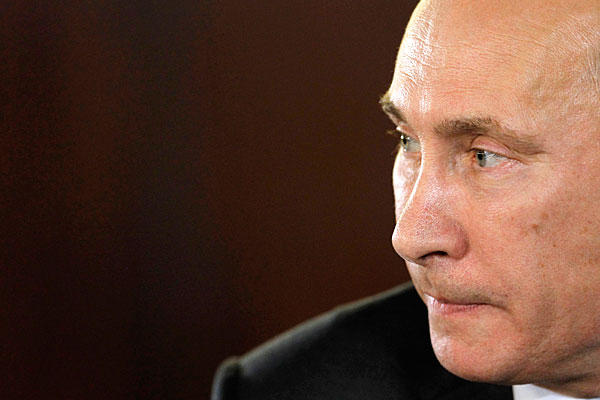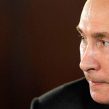
The Political Economy of the Russian Revolution in the Making
Publication: Eurasia Daily Monitor Volume: 9 Issue: 15
By:

The Russian economy generates no drivers for a political crisis – this elementary proposition underpins Prime Minister Vladimir Putin’s steady march to the presidential elections that are just six weeks away. He returns to the good economic news in every speech and article arguing that Russia, with its 4 percent GDP growth in 2011, was behind only China and India, while economists point out that Indonesia, Saudi Arabia, Kazakhstan and Ukraine also performed better (Nezavisimaya Gazeta, Vedomosti, January 18). Putin also asserts that Russia is the world leader in terms of the budget surplus, which is also a departure from reality and a result of the record high inflow of petro-revenues (www.newsru.com, January 20). In fact, given the very favorable conditions in the global markets of energy and metals, the Russian economy seriously underperformed in 2011, but Putin is not interested in discussing the effects of the “resource curse,” and has refused to participate in the debates of the presidential candidates.
Putin speaks not to the urban middle classes, well-informed about the real economic challenges, but to the pensioners, state employees and workers at the Soviet-era plants who constitute his core electorate and want to hear reassurances in undiminished budget generosity (www.forbes.ru, January 17). Pre-election promises are a dime a dozen, but Putin’s need for sustaining the support from the “masses” has serious implications for strategic choices in economic policy. These choices were scrutinized last week at the Gaidar conference, where leading economists and some of Putin’s ministers argued about the urgency of the reforms that should mitigate the impact of the deepening global recession (Nezavisimaya Gazeta, January 19; Kommersant, January 20). The problem with these reforms is that they answer primarily the interests of private entrepreneurs, who are increasingly in opposition to Putin’s regime and cannot be dissuaded from their preference for an open society (Moskovskiy Novosti, January 20).
Putin’s conservative and paternalistic electorate is suspicious of market competition and expects a further strengthening of the state’s direct control over the economy, which also sits better with his own vision of hierarchic governance. This course toward centrally-planned neo-industrialization has a strong militarist vector because armaments production is a major specialty of the Russian economy and employs millions of people particularly in small and medium-sized cities. This defense-industrial sector has an insatiable appetite for money from the federal budget, but its products and prices leave its prime customer – the defense ministry – increasingly dissatisfied. It is the technical failures in missiles that attract the most attention, as satellites crash down from odd orbits, but more damage is done by such trivial accidents as the fire in dry dock that has incapacitated Russia’s best strategic submarine, Yekaterinburg, for at least two years (Kommersant, January 19). Seeking to improve the management of the defense acquisitions Putin appointed the ambitious Dmitry Rogozin as Deputy Prime Minister, but his flamboyant style would hardly help much in converting the giant rusty plants into high-tech enterprises (Nezavisimaya Gazeta, January 20).
The former Finance Minister, Aleksei Kudrin, has become the leading critic of the wasteful and unsustainable channeling of budget resources into the rearmament program, but Putin resolutely rejects his prudent suggestions, knowing that they have to be taken into account and that many in the government do (RBC Daily, January 20). Even more striking is Putin’s readiness to put pressure on the oil and gas sector that used to enjoy his privileged attention, but now is treated as a reluctant source of revenues. Domestic prices on gas and electricity have been frozen until summer, the money flows inside the oil companies are now taxed more severely, but the external interests of Gazprom and Rosneft are largely neglected (Moskovskiy Novosti, January 19). Gazprom has to grant its European partners new concessions on prices and its crucially important negotiations with Ukraine on acquiring a controlling interest in the gas infrastructure are not going anywhere (Nezavisimaya Gazeta, January 18). Putin has recognized that his too close involvement with the gas business has become a political liability, while the very probable retreat of the oil prices constitutes the gravest risk to his policy of economic dirigisme.
Economic crises very often require such a policy, and sensible leaders are frequently compelled to postpone necessary reforms until after elections, but Putin’s predicament is of a different kind. He expected smooth sailing, which would have given him the freedom of political choices but now he has to fight for the coveted presidency and the mobilization of his support base requires a commitment to the course of firm central control over economic life (www.gazeta.ru, January 20). He has hardly any illusion about the efficiency of this control that has long degenerated into a system of bureaucratic predation, so that up to 30 percent of all economic activity takes place in the “shadow zone” of non-governmental taxation (Vedomosti, January 20). Contraction of petro-revenues determines the need to raise taxes in order to sustain the high volume of state expenditures, and that is certain to push more business underground. Entrepreneurs are hedging against the expansion of business-unfriendly policies by evacuating the profits to European “safe havens,” but now they have to take into account such new factors as the escalating political risk (www.gazeta.ru, January 18).
The direct economic impact of the two massive December rallies in Moscow remains statistically insignificant and no strikes are called for; but too many members of the business elite have gained first-hand experience in street politics to doubt the seriousness of this risk. The tactics of deception through dialogue aside, Putin’s ability to execute the minimal reform package acceptable for the “angry minority” is strictly limited by his commitment to a conservative program. The combination of “proletarian” populism and bureaucratic statism logically requires a third element – repression, and the attempt to ban the opposition march scheduled for February 4, might signify a turn in this direction. The problem is that the paternalism has become so false and the bureaucracy so corrupt that the repression could hardly be effective. The plain fact is that Putinism has stopped making economic sense, so its implosion is in no doubt – but the outcome of this messy process is very much in it.




